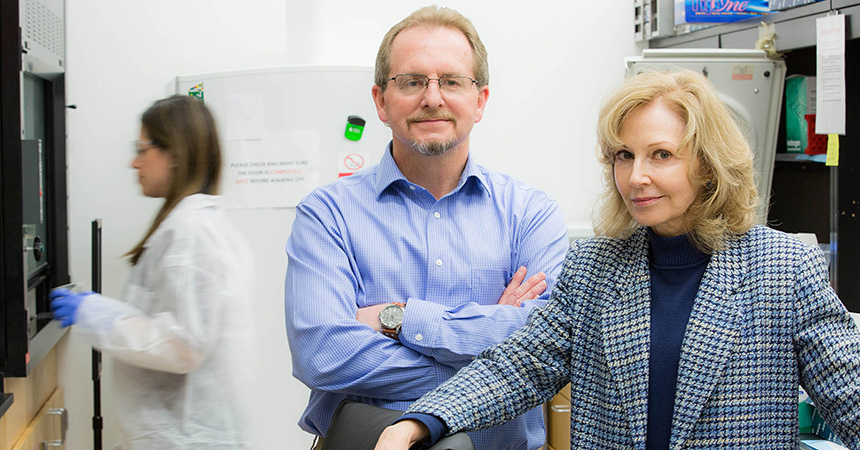Researchers examining if exercise can slow Parkinson’s
By Jan Jarvis
Army veteran RJ Hillman is learning to cope with personality changes that followed a mild traumatic brain injury six years ago in Afghanistan. More troubling is what may be ahead.
There is growing evidence that even a mild traumatic brain injury can increase the risk for Parkinson’s disease by 56 percent, said Vicki Nejtek, PhD, Associate Professor in the Institute for Healthy Aging, and Pharmacology and Neuroscience. The risk goes up to 83 percent for moderate to severe brain injuries. The disease also appears to have an earlier onset when there has been a brain injury.
Hillman said he worries that, beyond affecting his daily life, the neurological disease could force him to give up one of his greatest pleasures: fishing.
“Fine motor skills are imperative for fishing,” he said. “So the thought of losing something so important to my life is really heartbreaking.”
A cure has yet to be found, but it is possible that exercise could delay the onset or progression of the disease or reduce its severity, said Michael Salvatore, PhD, Associate Professor of Pharmacology and Neuroscience. He and Dr. Nejtek are working together to clarify the benefits of exercise and to determine if motor and cognitive functioning are better in people with Parkinson’s who regularly exercise.
But first, the risk for Parkinson’s must be identified. One way to identify the risk is to measure biomarkers in the blood. Dr. Nejtek is developing a cognitive profile that may be able to predict who might get the disease.
Previous studies have examined the risk of developing Alzheimer’s disease following a head injury, but some research suggests that the risk for Parkinson’s might be substantially greater, Dr. Nejtek said.
For the study, veterans with mild TBI are being matched with healthy adults of the same age, gender, race and educational background. Patients who have Parkinson’s are also in the study.
“We want to see if the veterans with mild traumatic brain injury perform similarly to Parkinson’s patients in the early stages of the disease,” Dr. Nejtek said. “We are examining biomarkers and cognitive function in veterans and comparing that with people who actually have Parkinson’s.”
Dan Novak, PhD, has had Parkinson’s disease for 12 years. He knows firsthand that the symptoms, which include tremors, stiffness in limbs and balance issues, develop slowly over many years.
“The disease is slow but not stoppable,” he said.
That makes it difficult to study because the motor symptoms do not appear until significant loss of dopamine neurons has occurred, Dr. Salvatore said.
“Someone who has Parkinson’s may not realize it until their motor systems are affected,” he said. “By then at least half of the dopamine neurons are lost.”
Exercise could be one way to delay the progression of the disease or reduce symptoms.
“I’m studying whether a patient who exercises early in the disease might be less impaired in the future than someone who does not exercise at all,” Dr. Salvatore said. If a veteran knows they are at risk, then could make effective lifestyle changes.”
Dr. Novak said he believes exercise is effective.
“It’s a progressive disease but exercise slows it down,” he said. “I feel like it has helped me.”





![Uyen Sa Nguyen Scaled[58]](https://www.unthsc.edu/newsroom/wp-content/uploads/sites/16/Uyen-Sa-Nguyen-scaled58-145x175.jpg)

Social media